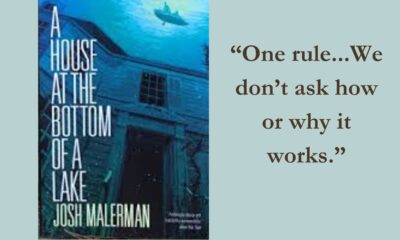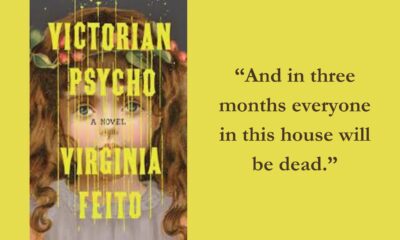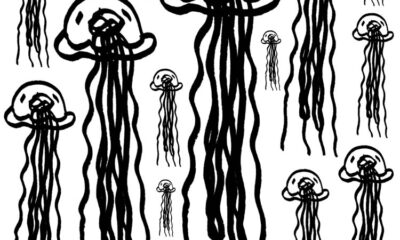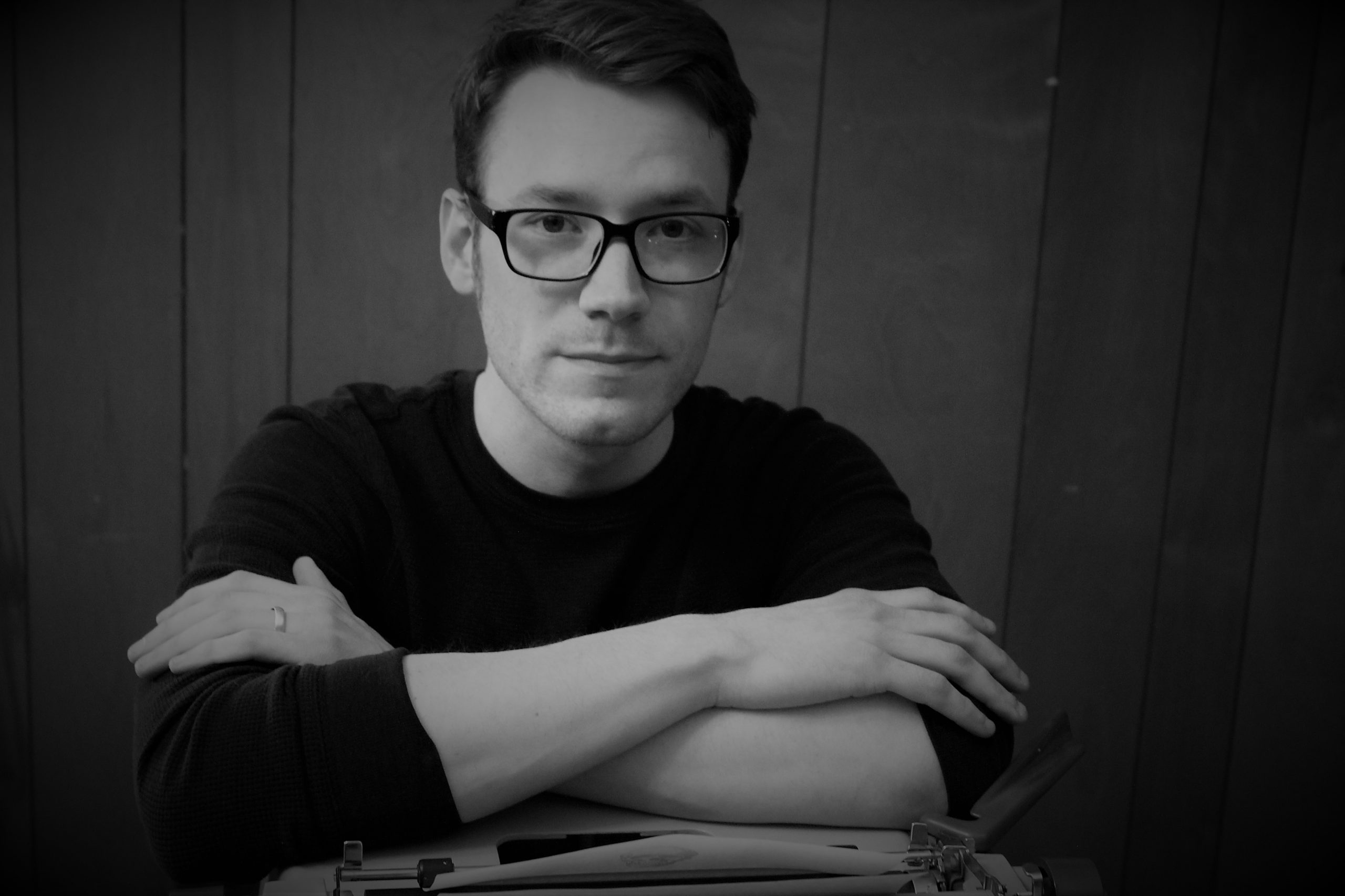
Haunted MTL Original – The Sick Man – Tylor James
More Videos
Published
4 years agoon
By
Shane M.“The Sick Man” by Tylor James
For better or worse, Jeffrey Caplinger was about to board. It was 9:35 on a frigid Chicago morning. He was prepared. He’d washed his hands fourteen times and crammed extra wads of Kleenex into his pockets (for door handling, primarily). His suitcase bulged with NyQuil, Ibuprofen, Robitussin, prescription Benzodiazepine, vitamins, one container of Lysol, three Kleenex mini-packs, and a plethora of other daily necessities.
Honolulu was his boss’ idea. If he had it his way, he’d be at home, lounging on his plastic-covered sofa and watching CNN. He’d been filling a Dixie cup by the water cooler when Tom Billingsly, supervisor of Bleecher Medical Supply, strode up to him.
“I’m sending you away,” he said.
Jeffrey blinked. “What?”
“To Hawaii, Jeffrey. You’ve earned it.”
Anxiously straightening his tie, he grabbed a fresh cup, and began filling. Billingsly’s bald head shone under the office fluorescents.
“Listen,” he said, “you’ve been a model employee for fifteen years. You pulled off the Fineman shipment single-handedly, our biggest annual order, at the same time your wife was dying of cancer.” Images of Marilyn’s shrunken, jaundiced head. Ripped colostomy bags. Sterile hospital rooms. The stench of chemo and death. Why did Billingsly have to mention his wife? “And,” he continued, “You were a key player in cleaning up the Bristol Meyer disaster when that whole thing went down. Remember all those defective nebulizers?” Yes, Jeffrey remembered. He’d spent four hours overtime every day for nearly a month sorting out paperwork, managing orders, even schlepping the defective products off the loading docks. “Our stocks plummeted lower than dog-shit, yet you hung in there. Day after day. Others took time off. Jody. Steve. Angela. Even the best of our team take off now and then. But you? You’ve never missed a day in all your years with Bleecher Medical, despite always worrying about getting sick.”
“I don’t always worrying about—“
Billingsly made as if he were shooing a fly. “Not a big deal. I’ve known plenty of hypochondriacs in my time.”
“I’m not a–“
“That’s not the point. Point is, I want you to go away, Jeffrey.”
“Away?”
“Jesus,” Billingsly sighed, exasperated. “I have to spell it out for you, don’t I? I’m sending you on a vacation, Jeffrey. Off to Honolulu you go. Two weeks. All expenses paid.”
Jeffrey began shaking his head.
“Stop shaking your head like that,” Billingsly ordered. “You look like a broken bobble-head.”
He stopped shaking his head.
“I mean, look at you, man! You’re as pale as that Dixie cup.” Jeffrey dropped the cup into the waste basket. “Go get yourself a tan. Watch some hula girls. Dip your feet in the ocean.”
Billingsly handed over a Delta airline ticket, a sunshiny Hawaiian brochure, plus a debit MasterCard with a fifteen hundred dollar spending limit. Jeffrey’s eyes widened at the gracious offering, yet his heart shrunk, closing itself off with pride.
“I can’t accept—“
“Shut up,” Billingsly said. “Boss’ orders. Your job now is kicking back in Honolulu. Take-off is nine thirty-five tomorrow morning. You miss it, it’s your ass.”
He retreated down the corridor. Susan, Billingsly’s secretary, sashayed over in her hip-hugging black skirt. She snatched the materials from Jeffrey’s hand, holding them up to her shocked, sea-blue eyes.
“I can’t believe it!” She stomped her high heels on the linoleum like a child. Several mousy eyes peeked above cubicle walls. “This is being wasted on you?” she shrieked. “I’ve been his fucking dog for three years and he’s wasting this opportunity on you? You’re too neurotic to even enjoy Hawaii!”
Jeffrey frowned, snatching back the papers. “Stop giving Billingsly head under his desk. Then maybe he’ll bribe you with a vacation of your own.”
She gasped, as if she’d been slapped. Jeffrey stalked off to the bathroom to wash his hands with a dollop of Dial. He’d accidentally grazed her left ring finger taking back his things.
Moment of truth, Jeffrey thought, as he shuffled in line across the boarding bridge. The old lady in front of him coughed. He held his breath, attempting not to breathe whatever disgusting virus she was hacking into the air. The seasonal flu, most likely.
She had all the signs: Pale complexion. Runny nose. Grating cough. She was repulsive. He wished he’d stayed home. Now it was too late. He’d boarded the plane. The old woman, hunched like a gargoyle, settled into her seat. Jeffrey collapsed into seat D3, beside the window, gasping flu-free air into his lungs. The old lady sat in the row behind him. Not directly behind his seat, but close enough to worry about getting coughed on.
Damn sick people! You’d think they’d just stay the hell home.
He stuffed his bag of clothes and medicine into the overhead compartment. He wanted to run to the bathroom and wash his hands, but it would’ve been difficult. Passengers congested the alley. They hunted for seats, murmuring amongst themselves, some even coughing and sneezing. A spray of germs flew out of a toddler’s mouth. Wet particles sparkled in sunbeams shining through the portholes. Jeffrey shut his eyes and pretended he was home.
He checked his pulse. Was his heart beating too slow? Too fast? He gazed at the window, not seeing the runway, but his own pale — too pale — face. His throat tickled with the beginnings of a sore throat. He was getting sick. From that old woman’s terrible, air-infecting cough. And from that little kid’s sparkling sneeze. I should’ve stayed home. It’s flu-season. I’m on a crowded plane. I should’ve stayed home.
Jeffrey half-arose, about to make a break for the bathroom. A visibly exhausted man slumped down in the aisle seat, leaving one vacant seat between them. Jeffrey opened his mouth. All that came out was an inarticulate series of stops and starts. A robot with a fried circuit board.
“But, you, uhm, err, I can’t . . .”
The man clenched his fedora within gnarled hands. His gaunt face, pallid as vanilla ice cream and probably just as cold, smiled. His lips were mauve. His blue eyes, cracked with bloodshot.
“Hello,” said the sick man. “Don’t mind me. Down with the flu, is all. Just pray you don’t get it, ’cause boy, it’s a doozy!”
“Doozy,” Jeffrey repeated, vacantly.
He wanted to scream. Instead, he shot straight up out of his seat, holding up his hand to be called upon, as if he’d relapsed into the third grade. A young, ruby-lipped flight attendant walked over.
“May I help you, Sir?”
He looked at her name tag. “P-pardon me, uhhm, Suzy. But this gentleman sitting next to me is seriously ill. I need to switch seats!”
Suzy’s cheeks flushed, embarrassed for the sick man.
“No worries.” The sick man smiled. “I wouldn’t want what I got, either. Name’s Jim, by the way.”
He held out his hand. Jeffrey reached into his pocket, covered his hand with three layers of Kleenex, then shook.
Jim frowned.
“I’m afraid this a full plane, Sir,” replied Suzy. “You’re free to ask anybody to change seats with you, but you’ll have to make it quick. Take-off is five minutes.”
“Five minutes?” Jeffrey asked. “That’s all I need.”
Suzy turned to Jim, the sick man. “Is there anything I can do for you, Sir? Would you care for some water?”
Sweat dripped from the sick man’s ivory forehead. “No. Thank you, dear. I’m fine.”
“Mam, I need to get through,” Jeffrey said. “Five minutes, remember?”
Suzy stepped aside, rolling her eyes as she returned to the front of the plane. The sick man chuckled before launching into a coughing fit.
Jeffrey asked several people to change seats, and had no luck. An obese woman, nearly too fat for her two purchased seats, sneezed into her handbag, giving whatever was in there a germy spray. Holding back his gag reflex, he greeted her. “Excuse me, mam. Would you change seats with me?”
“Change? Why?”
“Well, uhh . . .” Telling people he wanted to switch due to the person next to him coughing all over the place was not an enticing offer. “Just because!”
The woman raised an eyebrow. He immediately wanted to take it back. His voice had sounded whiny. Desperate.
She shook her head. “Sorry. I just got comfy.”
“Please, just change seats with me,” Jeffrey coaxed her. “There’s two vacant seats over three. D3 and D2. Please, I’m begging you.”
An old man with white, wiry eyebrows sat beside her in the window seat. His reed-thin figure was a stark contrast next to the rolls of cellulite clinging beneath the woman’s flower-patterned dress. Her calves, Jeffrey noticed, were thick as oak trees. Her chins as plentiful as the kind you’d find in a Chinese phone book.
“I’ll switch seats with you,” the old man said.
Jeffrey considered this prospect, and quickly decided it wouldn’t do. He’d only be switching the gaunt, pale sicko for a seat next to a fat, purse-sneezing sicko. It was merely trading one evil for another.
“Sir?” Suzy tapped his shoulder.
Jeffrey spun around. “Yes?”
“Would you please sit down? We’ll be in the air soon.”
He groaned, turning back to the plus-sized woman with the tacky flower dress. “Please, mam. Just this one favor.”
“I’ll trade!” The old man offered again. They both ignored him.
“Oh, fine!” The woman said. She attempted to stand, but her rotund hips stuck between the arm rests. Grunting, she couldn’t raise herself more than a few inches. He cheeks reddened before collapsing into her seat.
“Well, like I said,” she wheezed. “I just got comfy!”
“Excuse me, Sir?” Suzy said from behind. “I need you to return to your seat.”
Jeffrey turned right, where twin platinum blondes in their late teens sat next to each other. Beside the window sat an older man studying the Pioneer Post with hazel eyes that matched the girls’ — presumably their father.
“Will one of you switch seats with me?” he asked. “I’ll give you each fifty bucks.”
The twins exchanged a look, then shook their heads.
“How about you, Sir?” Nodding toward their father.
The man irritably folded his paper. “Are you kidding? No way.”
Suzy pecked at his shoulder like a stubborn bird.
“I’m going to ask you one last time, Sir.”
Jeffrey threw up his hands, returning to his seat beside the virus-infestation. The twins giggled. The fat woman sneezed into her handbag. The old man next to her wished Jeffrey had taken him up on his offer. He was squashed against the window like a bug.
Jeffrey sat down, ears burning at the sea of murmurs.
“Tough luck, pal,” the sick man grinned. He hacked into his palm, wiping the loogie onto his khakis. Jeffrey grimaced, then faced the porthole.
A second flight attendant shadowed Suzy at the front of the plane, informing passengers about exits, bathroom location, and safety precautions in case of a crash. Jeffrey opened the overhead compartment, rummaging through his bag. He chased down vitamins and NyQuil with a bottle of water.
Nine hours before landing. Could he survive that long? The attendants finished their spiel, one performing a ridiculous pantomime demonstration on how to wear a life jacket. The captain made customary pre-take-off announcements over the radio.
Jeffrey found himself smothering his hands with sanitizer and wallowing in self-contradiction. A part of him wanted to burst out of his seat and scream, “I’m getting the hell off this plane!” Another part forced himself to remain seated, to contemplate the germs in the air, the sick man beside him, the people sneezing and coughing about the plane, and to endure it all anyway.
To endure it with vitamins, NyQuil, and sanitizer. Just as he had endured every day of his life and career. Tom had been correct about Jeffrey never missing a day of work. At fifty-one years old, he wasn’t about to start now. People could call him whatever names they liked; hypochondriac, obsessive-compulsive nut, workaholic. None of it mattered. Going to work was like washing his hands.
Mandatory.
Non-negotiable.
A means of survival.
Your job now is to kick back in Hawaii, Tom Billingsly had told him.
Jeffrey buckled himself in, clung to the porthole as far away from the sick man as he could get, and braced himself for the flight. His throat tickled, as if his larynx were being prodded with a stick. He refused to cough.
If I cough, he thought, what if I never stop?
***
He’d slept most of the flight. The NyQuil had made him lethargic, even a bit light headed. The captain announced they’d be landing in approximately fifteen minutes. The sick man dozed in the aisle seat with the short-brim fedora over his face.
Jeffrey stood at the bathroom sink, washing his hands for the fourteenth time in a row. White, puffy spuds formed on his hands as he scrubbed between his fingers, under his nails, up his wrists and forearms. He inhaled the lemony scent and rejoiced.
Then he caught his reflection in the mirror. Was it his imagination, or did he not look so good? His face was pale as the snowflakes that had fallen that morning back in Chicago.
He turned off the faucet and paper-toweled his hands, feeling the machine-gun rhythm of his heart. The aging, chalky face in the mirror stared back at him. It’s probably just the stress of the flight, he thought. Billingsly’s right, old boy. You worry too much. He returned to his seat, inadvertently nudging the sick man’s bony knees. The fedora fell from his face, onto his lap.
“Oops,” Jeffrey said, buckling his seatbelt. “I’m sorry.”
He glanced at the sick man’s pallid face, then did a double-take and screamed.
Crimson tears dripped out of the man’s reddened corneas and down onto the collar of his brown tweed jacket, now darkly crusted with blood. His mouth hung open with blue lips. Jeffrey screamed again, like a little girl.
The family in the adjacent seat retracted, some of them gasping. The old, coughing woman in the row behind stooped over the man’s seat, gazing down into his blood-filled eyes. She appeared about to scream, yet lost her lunch instead. Gunky, Doritos-orange bile cascaded out her mouth, onto the corpse’s agape face. It splashed onto Jeffrey’s right cheek and shoulder. He shrieked, undoing his buckle and leaping up before the woman turned her stomach inside-out again.
Suzy and her co-worker, a pretty brunette named Charlene, swooped in to assess the situation. Charlene stumbled backward while screaming, then darted for the pilot’s quarters. Suzy managed to stifle her sobs long enough to tell passengers to remain seated and calm. Charlene returned with a barf bag for the old lady, but by then her bowels were well-emptied.
Jeffrey removed his soiled jacket, placing it over the body. He wiped the orange splatter from his cheek with a Lysol wipe. It did nothing, however, to alleviate the terrible stench of the plane; not anything like Doritos. A cross between rotten fish and spoiled milk. The old woman covered her orange speckled lips, but it wasn’t enough to prevent a rancid sneeze from spraying into the air, directly onto the back of Jeffrey’s neck.
***
The plane landed. Everyone survived the traumatic episode — except the sick man, of course. He’d died who knew how many hours back, quietly suffering under his beige fedora while blood leaked from his eyes. And some say there is a God, Jeffrey thought, checking into the Waikiki Hotel.
It had been the longest day of his life. A day of sickness, orange vomit, and a three hour barrage of post-landing interrogation with Delta security and Honolulu County police. He downed 20ml of Robitussin and took a hot shower. When the water grew cold, he stood there an hour longer, scrubbing until his skin became red-raw and his pores trickled blood.
After toweling off, he donned his robe. Never again will I listen to that shithead Tom Billingsly. Who the hell is he to demand I take a vacation? Thinks he can flash me some uppity pamphlets, just to show-off how much money he has. That lousy, arrogant, bald-headed bastard!
Rage atrophied his energy. Soon he was lying on the bed, fresh Kleenex in his hand as he used the TV remote to peruse stations. He ordered a porno, but shut it off less than five minutes in. It grossed him out thinking of how sick those people would undoubtedly become with all that saliva and other unmentionables flying around.
The gravity of sleep pulled him. His eyes fell shut, and he felt as if he were drowning . . . drowning with his face beneath a beige fedora.
The sick man’s last words resurfaced in his waning consciousness.
“Tough luck, pal,” the sick man had grinned. “Tough luck.”
***
Jeffrey drank at a tiki bar on the edge of Waikiki beach. The sand, like the people, was a tranquil shade of tan. White crests breached shore, then drew back, performing the eternal dance of crystal blue Pacific. He sat on a stool, people-watching while sipping Mai Tai through a loop-de-loop turquoise straw. His hair blew in a tissue-soft breeze as he sat in the cool shadow of the bar’s overhang. The bartender, a native Hawaiian, busied himself preparing food.
Something had changed in Jeffrey. He felt like a new man. It was well into the evening and he hadn’t washed his hands, nor used a single Kleenex. He felt brave. Rejuvenated. As if somehow a guy dying beside him and being splattered with old lady puke had strengthened him. That old, Nietzsche adage beamed in his Mai Tai addled mind: What doesn’t kill me makes me stronger.
A ropy muscled surfer at the end of the bar pushed aside his basket of half-eaten kalua pig, poi and a side of cold, Lomi-lomi salmon. Jeffrey’s stomach rumbled. He hadn’t eaten since yesterday morning.
“You going to eat that, Sir?”
“Nah,” the surfer said, smiling. “My eyes are bigger than my stomach. You want it?”
Jeffrey nodded. The man shrugged and slid the basket down the bar. Jeffrey feasted on the scraps, and when he was gone, licked his fingers.
“Good, eh?” asked the surfer.
“Scrumptious,” Jeffrey replied. “Say, bartender? Another Mai Tai, please? Actually, no — make that a Coconut Mojito.”
***
Sherbet orange and canary yellow flitted the western sky. The sun lowered behind Diamond Head range, the largest dormant volcano of all the Hawaiian islands. Jeffrey was drunk, happily swaying down the street, passing food courts. Palm trees cast shadows upon the sidewalk. Cars zoomed by on Kalakaua Avenue. The sky deepened red.
Sailor’s delight, he thought, and felt his throat tickle. He coughed. Then coughed repeatedly before forcing himself to knock it the hell off. Don’t you start that, or you’ll be coughing all night! It’s all in your head anyway, just as it always has. So just stop it.
Food stands selling burgers for twelve bucks. Hot dogs for seven. More tiki bars. Festive booths selling over-priced souvenirs marketed as authentic items of Polynesian lore. An old woman handed a fat, coffee-and-cream toned man a twenty, pocketing a kitsch tiki head into her purse.
Not just any old woman. The one from the plane. He froze in the middle of the sidewalk, people bristling by. His heart pounded. He wasn’t quite sure why, except that her paleness unnerved him — she was white as the foamy crests of the Waikiki waves. White as the moon rising into the twilight sky. Then her eyes — something dreadfully wrong about those, too. They were pink, nearly red.
Her eyes locked on his. She smiled. Her teeth were yellow, jagged, locked into a death grimace. She approached, hunched over like the guy from Notre Dame.
“Better enjoy your vacation, young man,” she gritted, ragged breaths issuing between clamped teeth. “It won’t last long.”
The sight of her made Jeffrey nauseous. He kept thinking of the orange bile. “What the hell are you on about, you old hag?” he asked.
She wheezed a bitter laugh and held up the tiki head.
“I’ve always wanted one of these,” she said. “Now I’ve got one. Most the other passengers are dead. Poor things. They’ll never have the opportunity to buy one.”
She crammed the tiki back into her purse, then hobbled past. She made a wheezing croak, like a raven cawing into the dark.
Jeffrey continued onward, disregarding his creeping gooseflesh. He felt tickling in his throat. And he felt faint, yes, and weak, as if he might melt and sag into a puddle on the pavement like a Dali painting. You’re being ridiculous! Don’t let that old bitch get to you. She’s obviously senile. I’m sure the other passengers are fine.
Night descended with a bright, waxing moon. Stars twinkled. Palm trees swayed, their leaves gleaming under starlight like verdant wax. He walked for miles, feeling the warm, tropical night on his skin. Ambling down Ala Wai Boulevard, then along its sister canal, the salt of the ocean lingered in his nostrils. He sneezed, spraying saliva and mucous into the air. He did it again. And again, before wiping his nose on the end of his Hawaiian t-shirt (a clothing item he never thought he’d wear). Just allergies, he told himself. Definitely not whatever the sick man had.
The cone ridge of Diamond Head loomed in the dark like a daunting mountain. A mad adventurousness, fueled by too many Mai Tai, mojitos, and too little food, beckoned him to climb. But when the avenue came to the base of the volcanic tuff, lethargy consumed his spirit. He turned around, heading toward the bright lights of civilization with its clean streets, high-rise hotels, and open air shopping malls.
***
Gravity was ruthless. He trudged the city blocks as if wading through knee-high molasses. At one point, passing a newspaper stand, he glimpsed a headline: CDC Reports Worldwide Virus Killing Millions. The old woman flashed through his mind. Had she not been as crazy as he assumed? Were his fellow passengers really dead?
Nonsense, he countered. The lady was crazier than a shit-house rat. He wiped the sweat from his face, pushing onward, short of breath.
As the hotel elevator carried him to his floor, he nearly crumpled. His feet dragged on the carpeted hallway, creating a surge of electric static to be released with a sharp zap as his hand touched the door lever to his room. A swipe of the magnetic key. He stumbled inside.
Jesus! Those drinks really caught up with me. He leaned against the wall for support. He coughed, sneezed, his throat tickling and head aching. He needed ibuprofen. NyQuil. Vitamins — all his vitamins.
Shambling around the corner into the bathroom, he finally admitted it.
He was sick. Down with the bug. The flu.
But definitely not down with whatever the sick man had. No, he wasn’t that bad off. He hadn’t been truly sick in years. His immune system, loyal warrior that it was, had finally lost a battle.
But not the war. It would’ve been paranoid to think so. He was done being paranoid. He’d wasted years that way. Today, he was a new man. A man who drank Mai Tai’s on Waikiki beach, eating surfer dudes’ unfinished platters.
He snatched the ibuprofen from the sink. Thumbing out three 200-milligram pills, he titled back his head and dropped them onto his tongue. He turned on the tap. Water ran into the bowl he’d formed with his hands, about to wash down the pills. He caught his reflection in the mirror cabinet.
It was not Jeffrey Caplinger in the mirror, staring back at him.
It was the sick man.
Gaunt, vanilla cream-pale face. Lips blue. Eyes blood-red. Raging with disease. His gut clenched tighter than a brawler’s fist. The pills, half-melted on his tongue, made his mouth chalky. The water rushing into the sink roared in his ears, as if he were standing on Waikiki Beach.
Yet instead of a rhapsody of tides, it sounded like an angry sea rising to wash him away; mounting waves to crash, to smother and drown him, carrying him fathoms down to the slick, seaweed bottoms where hungry creatures lurked and the abyss leveraged all power. A beckoning sepulcher.
His eyes were undeniably red, welling with tears. Dark crimson droplets splashed his cheeks, ran down his lips and chin, staining his mockingly vibrant t-shirt with silent bombs of blood.
His heart palpitated. A dreadful smile spider-crept across his face, exposing cracked yellow teeth turning to blood-tinted mush. He smiled wider, the death grimace dawning from ear to ear. Like slow-dripping cyanide, a realization eroded his defenses, revealing the terrible truth he’d been too cowardly to face.
He’d endured his life as if it were a chore.
He’d endured his wife until she died.
He’d endured his daughter until she was off to college, out of his life.
He’d endured his job until he’d boarded the plane.
And he’d endured the sick man, too.
Now, the only thing left to endure was the roaring, pounding rage inside his bleeding head. Jeffrey Caplinger, orange tongue grazing rotten teeth, spoke to the mirror:
“Tough luck, pal. Tough luck.”
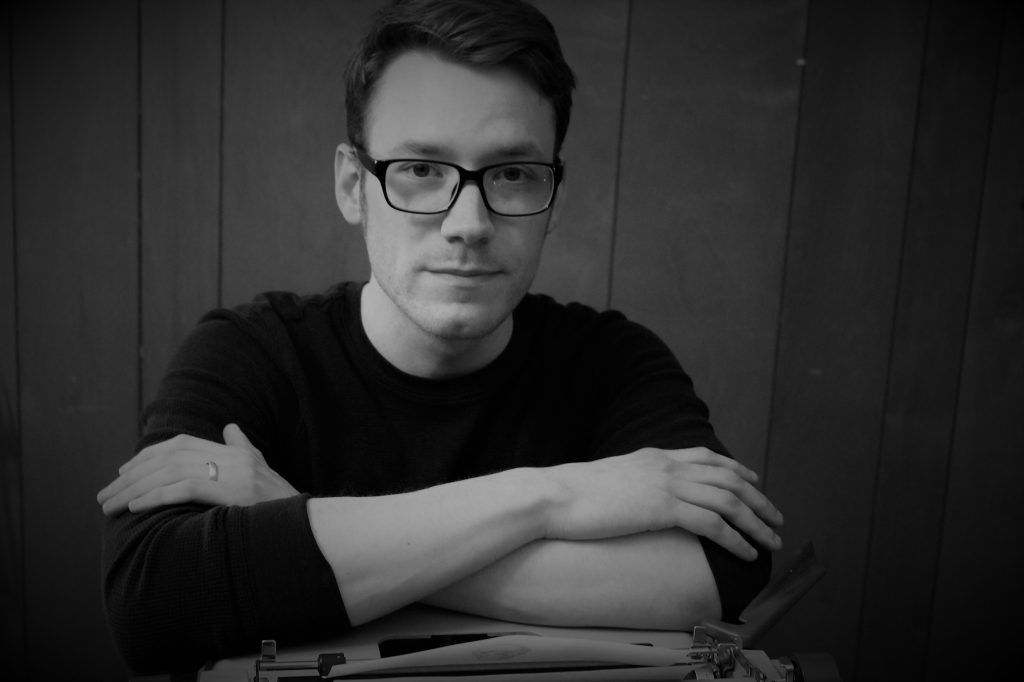
Tylor James lives in the American Midwest and is an affiliate member of the Horror Writers Association. MATTERS MOST MACABRE, his latest book, is a highly acclaimed collection of short stories. He’s also had strange tales of horror and fantasy published in Hypnos Magazine, The Literary Hatchet, Weirdsmith: Issue One, The Other Stories Podcast, and several anthologies. He writes one short story every week and is twenty-six years old.
You may like
Today on Nightmarish Nature we’re gonna revisit The Blob and jiggle our way to terror. Why? ‘Cause we’re just jellies – looking at those gelatinous denizens of the deep, as well as some snot-like land-bound monstrosities, and wishing we could ooze on down for some snoozy booze schmoozing action. Or something.
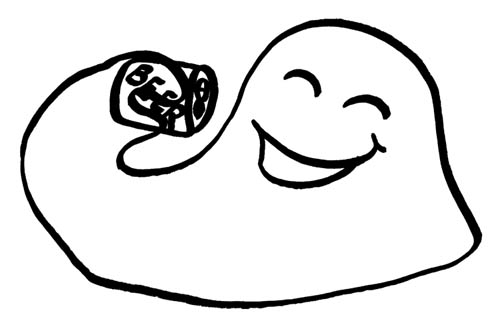
Honestly, I don’t know what exactly it is that jellyfish and slime molds do but whatever it is they do it well, which is why they’re still around despite being among the more ancient organism templates still in common use.
Jellyfish are on the rise.
Yeah, yeah, some species like moon jellies will hang out in huge blooms near the surface feeding, but that’s not what I meant. Jellyfish populations are up. They’re honing in on the open over-fished ocean and making themselves at home. Again.
And, although this makes the sea turtles happy since jellies are a favorite food staple of theirs, not much else is excited about the development. Except for those fish that like to hide out inside of their bells, assuming they don’t accidentally get eaten hanging out in there. But that’s a risk you gotta take when you’re trying to escape predation by surrounding yourself in a bubble of danger that itself wants to eat you. Be eaten or be eaten. Oh, wait…
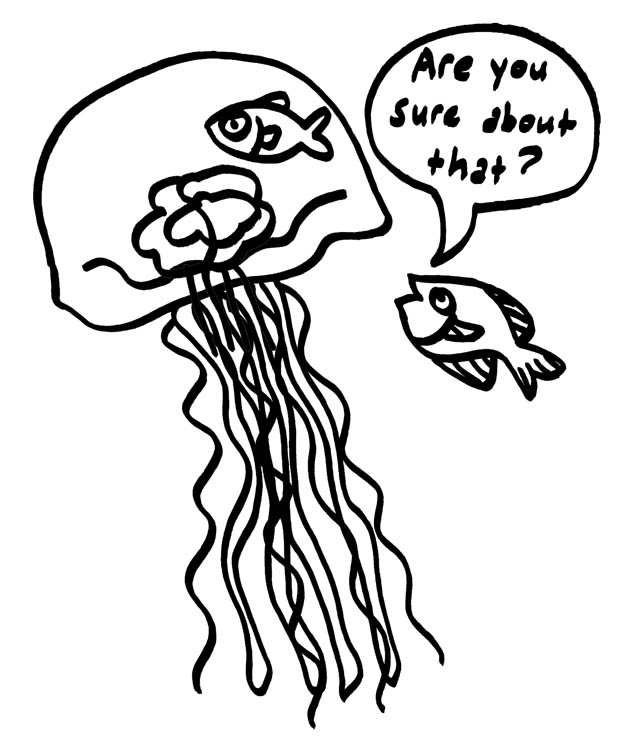
So what makes jellies so scary?
Jellyfish pack some mighty venom. Despite obvious differences in mobility, they are related to anemones and corals. But not the Man o’ War which looks similar but is actually a community of microorganisms that function together as a whole, not one creature. Not that it matters when you’re on the wrong end of a nematocyst, really. Because regardless what it’s attached to, that stings.
Box jellies are among the most venomous creatures in the world and can move of their own accord rather than just drifting about like many smaller jellyfish do. And even if they aren’t deadly, the venom from many jellyfish species will cause blisters and lesions that can take a long time to heal. So even if they do resemble free-floating plastic grocery bags, you’d do best to steer clear. Because those are some dangerous curves.
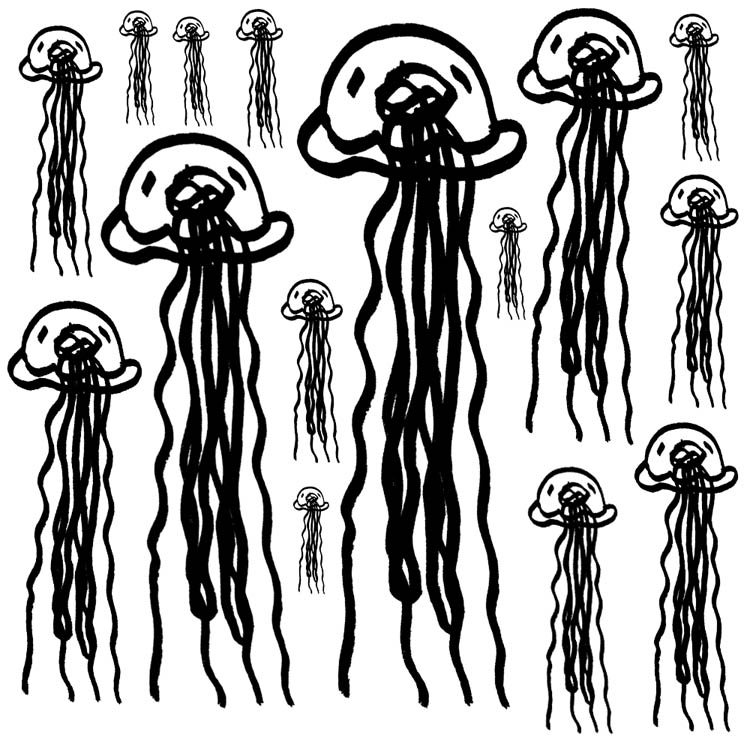
But what does this have to do with slime molds?
Absolutely nothing. I honestly don’t know enough about jellyfish or slime molds to devote the whole of a Nightmarish Nature segment to either, so they had to share. Essentially, this bit is what happened when I decided to toast a bagel before coming up with something to write about and spent a tad too much time in contemplation of my breakfast. I guess we’re lucky I didn’t have any cream cheese or clotted cream…
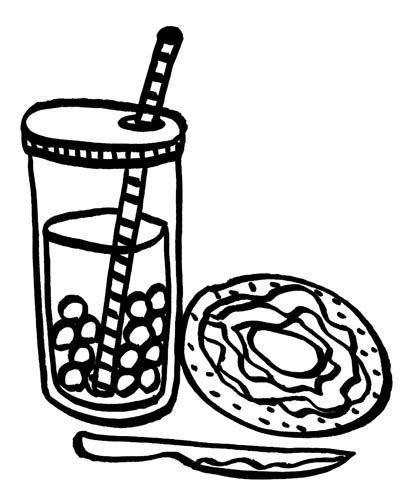
Oh, and also thinking about gelatinous cubes and oozes in the role-playing game sense – because those sort of seem like a weird hybrid between jellies and slime molds, as does The Blob. Any of those amoeba influenced creatures are horrific by their very nature – they don’t even need to be souped up, just ask anyone who’s had dysentery.
And one of the most interesting thing about slime molds is that they can take the shortest path to food even when confronted with very complex barriers. They are maze masterminds and would give the Minotaur more than a run for his money, especially if he had or was food. They have even proven capable of determining the most efficient paths for water lines or railways in metropolitan regions, which is kind of crazy when you really think about it. Check it out in Scientific American here. So, if we assume that this is essentially the model upon which The Blob was built, then it’s kind of a miracle anything got away. And slime molds are coming under closer scrutiny and study as alternative means of creating computer components are being explored.
Jellies are the Wave of the Future.
We are learning that there may be a myriad of uses for jellyfish from foodstuffs to cosmetic products as we rethink how we interact with them. They are even proving useful in cleaning up plastic pollution. I don’t know how I feel about the foodstuff angle for all that they’ve been a part of various recipes for a long time. From what I’ve seen of the jellyfish cookbook recipes, they just don’t look that appealing. But then again I hate boba with a passion, so I’m probably not the best candidate to consider the possibility.
So it seems that jellies are kind of the wave of the future as we find that they can help solve our problems. That’s pretty impressive for some brainless millions of years old critter condiments. Past – present – perpetuity! Who knows what else we’d have found if evolution hadn’t cleaned out the fridge every so often?
Feel free to check out more Nightmarish Nature here.
Original Series
Lucky Lucky Wolfwere Saga Part 4 from Jennifer Weigel
Published
2 weeks agoon
March 17, 2025Continuing our junkyard dawg werewolf story from the previous St. Patrick’s Days… though technically he’s more of a wolfwere but wolfwhatever. Anyway, here are Part 1 from 2022, Part 2 from 2023 and Part 3 from 2024 if you want to catch up.

Yeah I don’t know how you managed to find me after all this time. We haven’t been the easiest to track down, Monty and I, and we like it that way. Though actually, you’ve managed to find me every St. Patrick’s Day since 2022 despite me being someplace else every single time. It’s a little disconcerting, like I’m starting to wonder if I was microchipped way back in the day in 2021 when I was out lollygagging around and blacked out behind that taco hut…
Anyway as I’d mentioned before, that Scratchers was a winner. And I’d already moved in with Monty come last St. Patrick’s Day. Hell, he’d already begun the process of cashing in the Scratchers, and what a process that was. It made my head spin, like too many squirrels chirping at you from three different trees at once. We did get the money eventually though.
Since I saw you last, we were kicked out of Monty’s crap apartment and had gone to live with his parents while we sorted things out. Thank goodness that was short-lived; his mother is a nosy one for sure, and Monty didn’t want to let on he was sitting on a gold mine as he knew they’d want a cut even though they had it made already. She did make a mean brisket though, and it sure beat living with Sal. Just sayin.
Anyway, we finally got a better beater car and headed west. I was livin’ the dream. We were seeing the country, driving out along old Route 66, for the most part. At least until our car broke down just outside of Roswell near the mountains and we decided to just shack it up there. (Boy, Monty sure can pick ‘em. It’s like he has radar for bad cars. Calling them lemons would be generous. At least it’s not high maintenance women who won’t toss you table scraps or let you up on the sofa.)
We found ourselves the perfect little cabin in the woods. And it turns out we were in the heart of Bigfoot Country, depending on who you ask. I wouldn’t know, I’ve never seen one. But it seems that Monty was all into all of those supernatural things: aliens, Bigfoot, even werewolves. And finding out his instincts on me were legit only added fuel to that fire. So now he sees himself as some sort of paranormal investigator.
Whatever. I keep telling him this werewolf gig isn’t all that it’s cracked up to be, and it doesn’t work like in the movies. I wasn’t bitten, and I generally don’t bite unless provoked. He says technically I’m a wolfwere, to which I just reply “Where?” and smile. Whatever. It’s the little things I guess. I just wish everything didn’t come out as a bark most of the time, though Monty’s gotten pretty good at interpreting… As long as he doesn’t get the government involved, and considering his take on the government himself that would seem to be a long stretch. We both prefer the down low.
So here we are, still livin’ the dream. There aren’t all that many rabbits out here but it’s quiet and the locals don’t seem to notice me all that much. And Monty can run around and make like he’s gonna have some kind of sighting of Bigfoot or aliens or the like. As long as the pantry’s stocked it’s no hair off my back. Sure, there are scads of tourists, but they can be fun to mess around with, especially at that time of the month if I happen to catch them out and about.
Speaking of tourists, I even ran into that misspent youth from way back in 2021 at the convenience store; I spotted him at the Quickie Mart along the highway here. I guess he and his girlfriend were apparently on walkabout (or car-about) perhaps making their way to California or something. He even bought me another cookie. Small world. But we all knew that already…
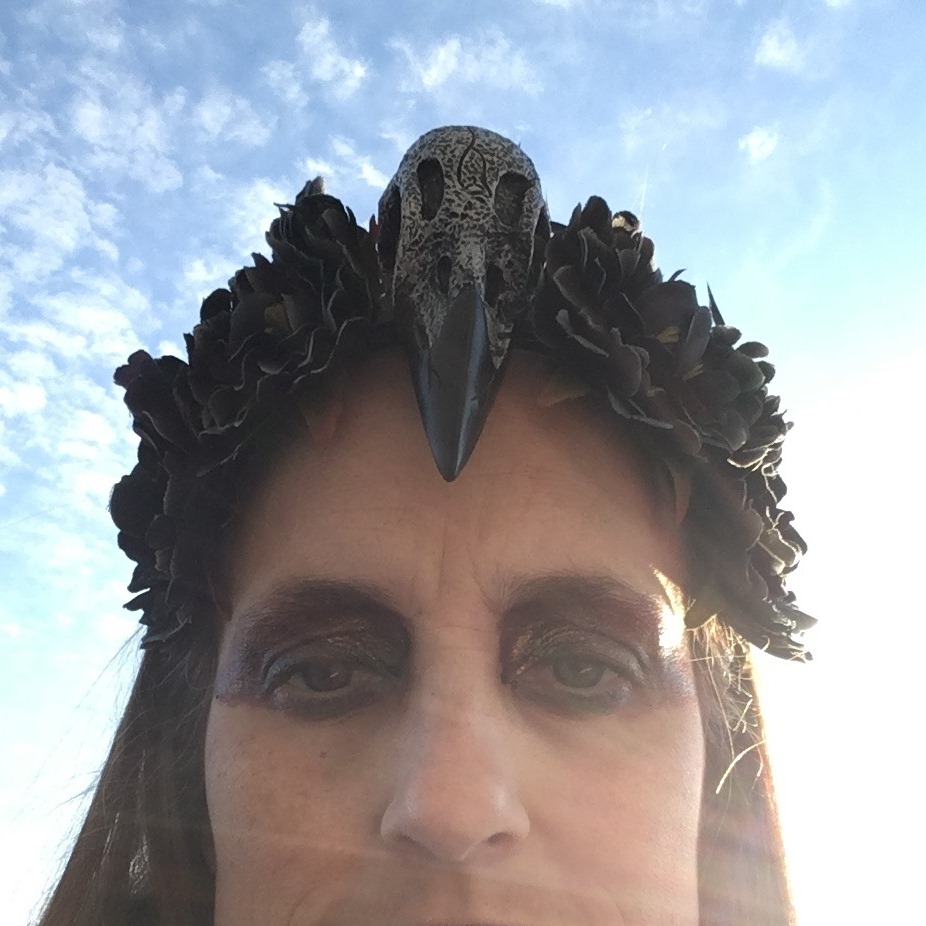
If you enjoyed this werewolf wolfwere wolfwhatever saga, feel free to check out more of Jennifer Weigel’s work here on Haunted MTL or here on her website.
Original Creations
Costumes – Figure Modeling Highlights with Jennifer Weigel
Published
2 weeks agoon
March 16, 2025You’ve seen me as Theda Bara, a Witch, and a Necromancer already (as well as Cleopatra, Elvis, and Andy Warhol) but here are some more fun costumes I’ve worn while figure modeling for the Friday morning art group at Hutchinson Art Center. The group is switching to Saturdays but hopefully I’ll still be able to make it in from time to time… Life’s a circus, or maybe a magic act in a shamanic ritual with Holly Hobbie… At any rate – beam me up Scotty, I have your missing spaceship part…

Yeah yeah, so none of that was really all that terrifying. Just another time warp in all honesty. At least there’s still some residual Rocky Horror vibes to be found, but then again, there usually are with me when I get into the identity based costumes.
But in follow up and in the spirit of so much of my other randomness, here’s a music video for Everything Changes by Eytan and The Embassy. Check it out if you want to see some more fun costumes in an immersive homage montage experience unlike any other. (If the video doesn’t load, just follow the link here.) See how many artists you can recognize in this quick change setup. Ready… Set… Go!






